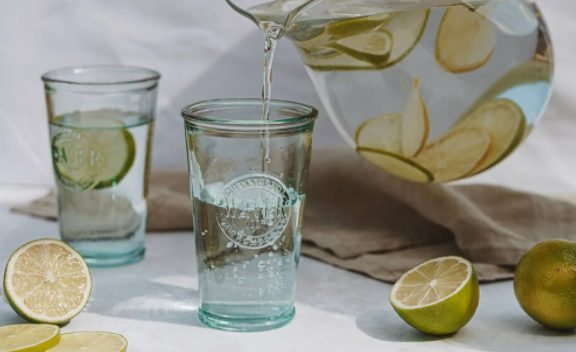We’re guessing you’ve gotten the memo that water is the key to youthful, glossy, clear, and plump skin. Ask any celebrity what their skincare secret is, and they’ll say that downing eight glasses of water is the way to glow! But can you really quench thirsty-feeling skin from the inside?
On account of world water day, we took upon the mission to find if gulping glass after glass after glass of the clear stuff actually has a measurable effect on the skin. Here, we tapped Celebrity Cosmetic Dermatologist, Dr Chytra V Anand, to investigate whether water is actually contributing to better skin health, or it’s just a widespread myth we’ve come to accept as gospel. Keep scrolling to know how you can take a 360-degree approach to hydration!
What Does Water Do For Your Skin?

“Drinking water doesn’t actually do a lot for the skin, it indirectly supports the skin by supporting the body functions like temperature regulation, toxin flushing, motioning of skin tissue, and joint lubrication,” says Dr Anand. Water is a critical component in the skin barrier for the hydro-lipid membrane barrier which acts as a sealant to the skin. This barrier is also called the acid mantle and it prevents dehydration. When this barrier is damaged due to lack of water or dehydration, the skin loses its protective skin barrier and is prone to dryness, flakiness, scoring an infection easily.
How To Know If Your Skin’s Hydrated Or Dehydrated?
Hydrated skin is soft to touch, supple, bouncy. It has good elasticity and is easy to maintain. When skin is hydrated it heals well with minimal scarring. Dehydrated skin is sensitive in nature, feels dry and tight, prone to itching, rashes, redness, and scarring. When skin is dehydrated, it feels uncomfortable and is reacting to the external environment and skincare products. It has a dull look and feel, and it shows signs of premature ageing like fine lines.
What’s The Difference Between Dehydrated Skin & Dry Skin?

“Hydration is about the water company whereas dryness is about the oil component in the skin. Both of these are required for healthy skin,” says Dr Chytra V Anand. Dry skin is rough in texture, flaky, and is easily irritable. Dry skin requires moisturiser with ceramides and squalene to repair itself, whereas dehydrated skin needs hydrators with Sodium hyaluronate and hyaluronic acid. Using facial oils will help dry skin but not dehydrated skin.
Does Water Actually Hydrate Your Skin?
Drinking water orally doesn’t actually hydrate your skin directly. Water first is absorbed by the body, flushes out the toxins, is filtered by the kidney, and then passes into the cells. Whatever is excess water the body does not need for its daily functioning is then passed on to the skin cells for hydration. Therefore it is actually a myth to say ‘if you are dehydrated drink more water.’
6 Ways To Keep Your Skin Hydrated And Plump
Ahead, find seven tips to keep your skin glassy, glowy, and hydrated!
- Apply a hyaluronic acid or a sodium hydrator to cleansed skin.
- Avoid using hot water. Always use cool water on the face and body.
- Apply sunscreen daily to avoid free radical damage. Keep it protected from harmful UV rays as this leads to dehydration.
- If you are in dry environments use a humectant on your face or a humidifier in your surroundings.
- Stay sufficiently well-nourished and hydrated to help the skin cells repair itself otherwise it can lead to dehydration.
- Incorporate electrolytes on a daily basis in form of coconut water, banana, etc,. to help move the water faster into the cells.
Healthy skin is in!
Featured Image: Pexels








